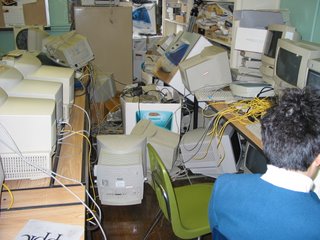
Pay close attention to those piles of computers on your loading docks and in storage rooms at work, and in your garage, attics, and sheds at home. A number of proposals are popping up again about a national e-waste recycling policy. Maybe you'll be able to get rid of them (or the next batch) and feel confident they are being handled properly.
The groundswell may in part be a result of Washington state's recent passage of legislation requiring the industry to implement a statewide electronics collection and recycling program beginning in 2009. The legislation establishes the Washington Materials Management and Financing Authority. Washington joins Massachusetts, California, Maryland, and Maine with such a mandate.
State mandates are what happens when the federal government does not take the lead on solving problems of national scale. If a few more states get out in front on these issues the computer industry is going to begin to taste the fruits of their indecision and allegiance to profits-without-responsibility.
Several years ago stakeholders from industry, government, environmental and consumer groups got close to an agreement with the National Electronics Product Stewardship Initiative (NEPSI), but in the final days of work electronics manufacturers were unable to agree on how to structure and finance a national program.
A new group has been meeting on and off for the past year, however, looking at certification programs for recyclers. The issue of e-waste dumping in developing countries, prison labor, and fair trade are major issues. (see the link below for information on the Basel Action Network, a group dedicated to controlling the globalization of toxic trade).
And the advocacy for some type of national recovery program now includes Wal-Mart, the National Solid Waste Management Association (although they still maintain there are no proven health hazards associated with electronics disposal), Hewlett-Packard, Toshiba (developing a product in conjunction with Wal-Mart), and Amazon.com. Even the US Postal Service is getting into the act actively seeking partners to establish a national cell phone a printer cartridge recycling program.
In the end, Electro-Scrap represents a highly complex set of issues. It's too early to tell which way the wind is going to blow, but it seems clear that this is an area where the notion of Extended Producer Responsibility will get played out once and for all. The computer and softward industries drive much of the U.S. economy and the basis for their profits is a new age version of "planned obsolescence." Lead-embedded computer monitors and television sets (many of which will become junk over the next decade as this country fades into High-Definition TV) should not be piled up in landfills or burned in incinerators. Without national standards and full, comprehensive, binding rules for the end of life for electronic components, consumers (and that includes institutions and businesses) will continue to pay the price of disposal every two years or so when it's time to upgrade technologies.
Comments